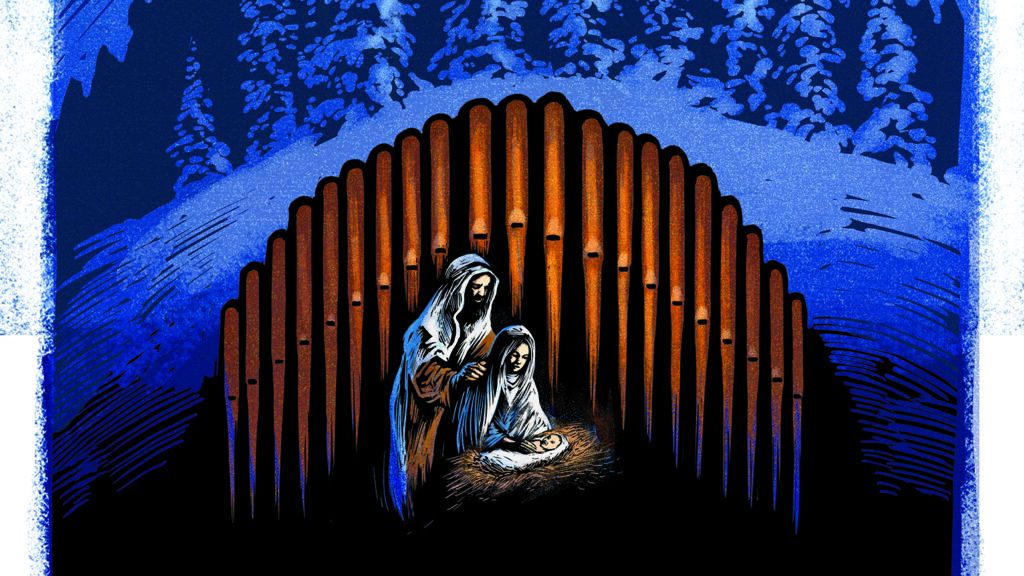My husband and I were staying in the little village of Oberndorf, Austria, when the letter reached us that December.
“You picked the right Christmas to be away!” our friend began.
Our church back home—St. Mark’s in Mt. Kisco, New York—he went on, was having the asbestos insulation removed from the heating pipes in its basement. Since the air intake for the organ was also in the basement, this meant that as long as asbestos dust was being created, the instrument could not be played. If the job wasn’t finished by Christmas Eve, our friend continued, he and his wife would have to go to church elsewhere.
“Can you imagine the midnight service without the organ?” he wrote.
I put the letter on the windowsill and looked across the swirling gray water of the Salzach River to the distant Alps. The Salzach takes a horseshoe loop at Oberndorf, and where the river curves, a church used to stand. High water had eaten away its foundations, and eventually the building was torn down. But I wanted to tell our friend about that vanished church. Because there too, one Christmas Eve, the organ had been silent.…
Dampness from the river had corroded the pipes until by Christmas Eve of 1818, the organ in Oberndorf was emitting only a wheezy whisper—and the itinerant organ mender was not due in the village until the following week.
The bad news especially affected two young men. One was the 31-year-old church organist, Franz Gruber. As a boy, Franz had often been beaten for sneaking away from his linen loom to take music lessons. Now he had worked hard rehearsing the village choir for the midnight service. But to ask them to sing the elaborate Christmas chorales unaccompanied was out of the question, and Franz was in despair.
Equally distressed was the 25-year-old pastor, Joseph Mohr. A child born out of wedlock, educated for the priesthood on the charity of the church, Joseph had only recently been ordained. He’d dreamed of making this Christmas celebration an especially glorious one, but here it was December 24, and no organ!
Joseph did own a guitar. But a guitar could hardly substitute for the organ on a night like this, with its tradition of elaborate fugues and cantatas. If only there were some melody simple enough for a guitar to carry by itself, with homely words to capture the holiness of this special night.
Even as the wish formed itself, words began to come, words based on a poem he’d written two years before. The priest seized a scrap of paper and began to write, his quill pen racing across the page.
It was the afternoon of Christmas Eve when Joseph showed the little poem to the organist. Could Franz set the words to a melody for the guitar? Franz Gruber said he would try.
The choir was assembling by the time he finished. It was too late to teach them the whole piece, so Joseph and Franz decided to sing the song as a duet, with the choir repeating just the last line of each verse.
And so it was that the disgruntled church congregation, muttering over their mute and useless organ, heard instead the new pastor’s tenor voice and the bass voice of their organist, singing a song to the plucking of a guitar, the choir echoing the final words.
The words stuck in the worshippers’ minds, and so did the tune; many were humming it as they left that night.
They were still humming it when the organ mender arrived in Oberndorf a few days later. He liked the song so much he committed both the words and music to memory and played it as he journeyed from town to town. In the Tyrol, a group of traveling singers added it to their repertoire.
Joseph Mohr and Franz Gruber never knew the end of the story. Neither man guessed that the song they had created the night the organ failed was to become the world’s most popular Christmas carol.
But it was about that original organless service back in 1818 that I wanted to write our friend. There must have been many in that congregation who’d been tempted to go somewhere else that night. And that would have been too bad. They would have missed a chance to see what God can do with bad news. They would not have been in Oberndorf to hear the very first singing of “Silent Night.”






